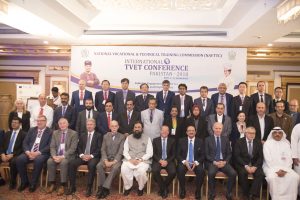 Attempts at bringing in the private industry in the TVET sector should be all-encompassing, covering all aspects, ranging from their input in designing curriculum to evaluating students. Making the industry stakeholder in the entire process will help in gaining their trust and support.
Attempts at bringing in the private industry in the TVET sector should be all-encompassing, covering all aspects, ranging from their input in designing curriculum to evaluating students. Making the industry stakeholder in the entire process will help in gaining their trust and support.
These thoughts came in a 2-day international conference on “Engaging Private Sector for Growth and Employability”, organized by National Vocational Training and Technical Education Commission (NAVTTC) and the TVET Sector Support Programme, on 3-4 May 2018 in Islamabad. Attended by over 100 participants from government, industry, media, public sector, diplomatic missions, along with delegates from 23 countries, the conference discussed best global practices on leading TVET sector besides discussing reforms for Pakistan.
The conference explored how the private sector of Pakistan can be engaged in the TVET sector so as to generate economic growth and employment in the country. NAVTTC credited that it has already established linkages with all 43 chambers of the country, and that its annual job fairs are eagerly attended by the industry. Yet the commission understood that a lot needs to be done.
 Industry representatives argued that the skills provided by the training centres are not relevant to them. They alleged that the trainees are mostly taught theory, have little hands-on experience of technology, especially of high-tech, and lack basic values of worth ethics and productivity.
Industry representatives argued that the skills provided by the training centres are not relevant to them. They alleged that the trainees are mostly taught theory, have little hands-on experience of technology, especially of high-tech, and lack basic values of worth ethics and productivity.
Opinion was divided on whether the industry should be legally bound to hire trainees; even those who favoured linked it to the incentives that should be given to the industry. Any legal commitment should aim at ensuring its strict adherence; poor implementation will otherwise dent the credibility of the framework. This came as the country’s new TVET regulatory framework is being under discussion for enactment.
The conference also emphasized significance of TVET sector for the country’s development. At a macro-level, Pakistan can boost its remittances from Gulf countries or widen its access to European market, if it invests in the skill sets of those leaving for abroad. The newly-announced multi-billion China-Pakistan Economic Corridor (CPEC) is another set of opportunity that will rely heavily on vocational skills. To capture these potentials, there is a need for regularly surveying the needs of the market, especially by involving industry.
Internally, proper skills can help bring stability too, as many under-developed areas of Pakistan are also conflict-prone. Similarly, well-thought-out TVET initiatives for marginalized groups can help overcome their sense of exclusion. These include for women, who are at least half of the country’s population; religious minorities, who are forced into stereotypical jobs; and persons living with disabilities, whose disability is a great factor in the poverty.


For all the positive impact of TVET on socio-economic development, the narrative of TVET should be conveyed to those who regularly invoke the term “education reforms” for various social reforms. The conference called for increasing the funding to TVET, bringing it at par with other tiers of education. Coordination with other public-sector departments will benefit TVET sector, especially curriculum development and training. All these efforts will contribute in overcoming the negative perception of TVET jobs among parents, thereby making TVET an option worth exploring.
Click here for detailed conference report
 Pakistan TVET REFORM Support Programme Technical and Vocational Education and Training (TVET) Reform support Programme
Pakistan TVET REFORM Support Programme Technical and Vocational Education and Training (TVET) Reform support Programme






